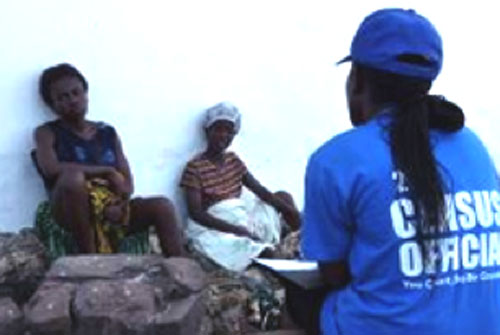Ghana’s ‘census refuseniks’, no laughing matter!
On the face of it, the idea that anybody would demand payment before they agree to be counted in the ongoing, twin enumeration, the 2021 Population and Housing Census (PHC), is quite amusing.
It is the sort of anecdote that generates a smile or laughter. But, on reflection, is it really humorous?
Is such a demand rather not cause for serious disquiet, as it implies a state of worrying ignorance or recalcitrance – or both?
I recall that in my school days, we used to have an expression, ‘volu-compor’ (short for voluntary-compulsory), coined to describe a situation where a directive was supposed to be voluntary, yet failure to comply would result in punishment.
Censuses appear to fall into the ‘volu-compor’ category. Although people are being encouraged to participate in the exercise, what is not common knowledge in Ghana is that there are sanctions for the ‘refusers’, those who refuse to be counted, also known as ‘census-refuseniks’.
Indeed, the census is regarded so important to national advancement, that countries punish those found guilty of not participating in it.
For example, the UK’s Office for National Statistics, the body in charge of their census, gives this warning:
“If you do not fill in the census, a census officer will contact you and encourage you to complete it. … If you still don’t return a completed census, you will be committing a crime and you will be contacted by our Non-Compliance team. If prosecuted, you may have to pay a fine of up to £1,000 plus court costs.”
The reasons for a country to count its people are numerous, starting with the fact that a government needs to know its population, so as to know how to share the proverbial national kenkey.
Ghana’s 2021 PHC, the third combined enumeration of houses and people since 2000, started on June 27, tagged as ‘Census Night’, the reference date for census questions.
The 14-day exercise, which will end on July 11, is under the rather catchy slogan ‘You Count, Get Counted’.
Although the census is done every 10 years, the 2020 one had to be rescheduled owing to the Covid-19 pandemic.
As Ghana never misses an opportunity to be a pacesetter, instead of enumerators turning up on doorsteps with paper questionnaires, the PHC data will be ‘high-tech’: for the first time, it’s a completely digital compilation of data.
According to the Ghana Statistical Service (GSS), the institution responsible for the exercise, the census enumerators will be capturing the information on a tablet computer, popularly known as ‘tablet’.
MyJoyOnline notes, also, that “The PHC of 2021 will also see the implementation, for the first time, data linkage technology that is intended to harmonise and improve statistics in the West Africa sub region.”
Explaining the Benefits of the census, among its other purposes, the GSS states: “Since the last census in 2010, there have been many changes in the structure of the population. In this regard, there is a need for a census to update the socio-demographic and economic data in the country and ascertain changes that have occurred in the population structure since 2010.”
Thus it shouldn’t be taken as merely comical that anybody would be so naïve, or so uninformed, as to think that participation in the census will benefit somebody else, not themselves, and so they need to be paid!
Yet, as reported by the Ghana News Agency, no less a person than the Vice-President, Dr Mahamudu Bawumia, “has asked persons who either refuse to provide responses or request payment from Census Enumerators to desist from such unpatriotic practices.
He said it was a legal obligation and civic responsibility of everyone resident in the country, including foreigners, to provide accurate information on their households and (it) should be done without coercion or inducement.”
It’s also noteworthy that at a media briefing last week, the Government Statistician, Professor Samuel Kobina Annim, reportedly gave a stern reminder that failure to participate in the census attracts a fine or a term of imprisonment.
The other disturbing revelation is that there are people who refuse to participate in the census because they say they don’t see its relevance to their lives.
But those are not the only people of concern.
Despite all the extensive publicity, a number of those interviewed by the media, insist that it’s news to them; they have no idea that there is a census going on!
Of course it’s possible for people to decide to be ‘census-refuseniks’ for other reasons, not lack of information, but the question is, did the staff assigned to carry out census publicity and education really reach all corners of the country?
Furthermore, was the reason for a census explained to the peoples’ understanding? Were any groups identified as needing extra attention?
Nevertheless, as there is a week left, I believe it’s not too late to coax the refusers on board the census train.
Another issue: If some people claim that they don’t know about the census, and others that they don’t understand what the exercise is about, what is the guarantee that the hordes of foreign refugees on our streets, especially those who neither speak English nor any Ghanaian language, will have heard about the census?
Has this category been factored into the planning?
Hopefully, the census findings will answer definitively some of the nagging questions, including why despite the best efforts of successive governments, population growth never seems to catch up with development needs, such as the never ending discoveries of more ‘schools under trees’ and sanitation shortcomings.
Anyway, my house has been enumerated and I’m looking forward to the second part of the exercise.
Having my details, and those of my household, entered in one of the GSS tablets, will make us part of the 2021 historic, novelty census.
I’m definitely ready to give the Government my part of the information needed for the country’s development, proof that I, too, count.



